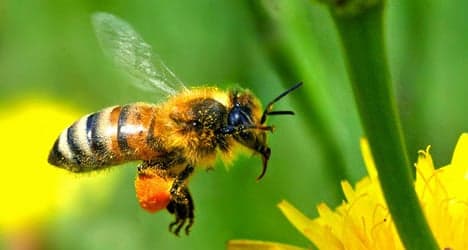Metal detector bees give gold mine green light

An analysis of the nectar and pollen collected by two colonies of 40,000 honey bees has been enough for a gold company to determine that their mine in northern Spain is safe to re-open.
Spanish NGO Wild Animal Protection Fund (FAPAS) is responsible for the buzz around the wild idea.
"It's a simple, quick, natural and efficient method," director Roberto Hartasánchez told Spanish daily El Pais.
The analysis-by-bee, which reveals the amount of contaminating heavy metals in the soil, cost only €300.
Opposition to the mine from from local residents had stung Asturgold, the site's owner.
It made a beeline for FAPAS to ask about biodiversity conservation models for the area, located in Tapia de Casariego, Asturia.
FAPAS felt that it was a good opportunity to help the mine be run in a way that took environmental impact into consideration.
Last July, FAPAS placed two bee colonies on the site of the mine, using controls to guarantee that the only nectar that they collected would be from plants within the local area.
The site became a hive of activity as the bees went to work over the summer and early autumn.
"As plants obtain their nutrients from the soil, if there is contamination then we can be sure that it is proportionally reflected in their flowers."
"In this manner we can detect contamination levels."
Results from the nectar collected in September indicated that the levels of naturally-occurring but potentially dangerous heavy metals, such as arsenic and mercury, on the site "were within normal values", said Hartasánchez.
The gold seam, one of the biggest unexploited deposits in western Europe, was originally mined by the Romans.
It passed a partial environmental impact inspection last December, but that did not include any possible treatment plant or slurry deposits.
The company has stated that it would only carry out cyanide treatment of mined gold outside Spain.
Comments
See Also
Spanish NGO Wild Animal Protection Fund (FAPAS) is responsible for the buzz around the wild idea.
"It's a simple, quick, natural and efficient method," director Roberto Hartasánchez told Spanish daily El Pais.
The analysis-by-bee, which reveals the amount of contaminating heavy metals in the soil, cost only €300.
Opposition to the mine from from local residents had stung Asturgold, the site's owner.
It made a beeline for FAPAS to ask about biodiversity conservation models for the area, located in Tapia de Casariego, Asturia.
FAPAS felt that it was a good opportunity to help the mine be run in a way that took environmental impact into consideration.
Last July, FAPAS placed two bee colonies on the site of the mine, using controls to guarantee that the only nectar that they collected would be from plants within the local area.
The site became a hive of activity as the bees went to work over the summer and early autumn.
"As plants obtain their nutrients from the soil, if there is contamination then we can be sure that it is proportionally reflected in their flowers."
"In this manner we can detect contamination levels."
Results from the nectar collected in September indicated that the levels of naturally-occurring but potentially dangerous heavy metals, such as arsenic and mercury, on the site "were within normal values", said Hartasánchez.
The gold seam, one of the biggest unexploited deposits in western Europe, was originally mined by the Romans.
It passed a partial environmental impact inspection last December, but that did not include any possible treatment plant or slurry deposits.
The company has stated that it would only carry out cyanide treatment of mined gold outside Spain.
Join the conversation in our comments section below. Share your own views and experience and if you have a question or suggestion for our journalists then email us at [email protected].
Please keep comments civil, constructive and on topic – and make sure to read our terms of use before getting involved.
Please log in here to leave a comment.